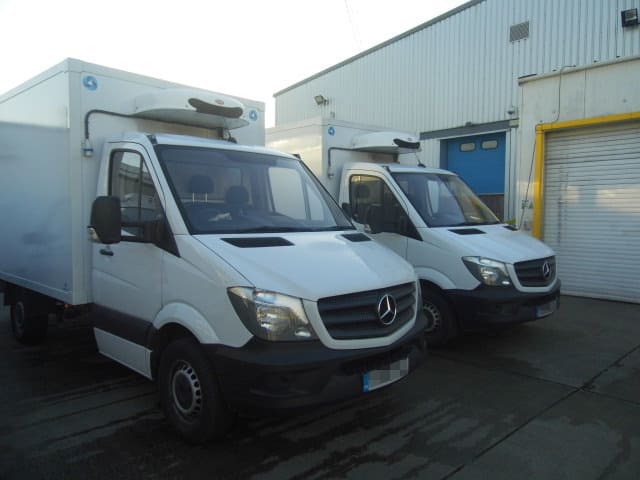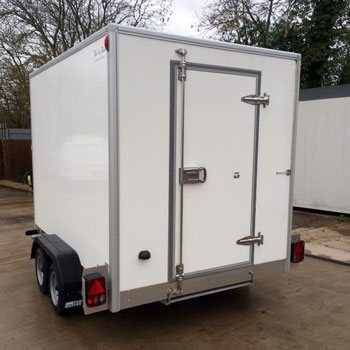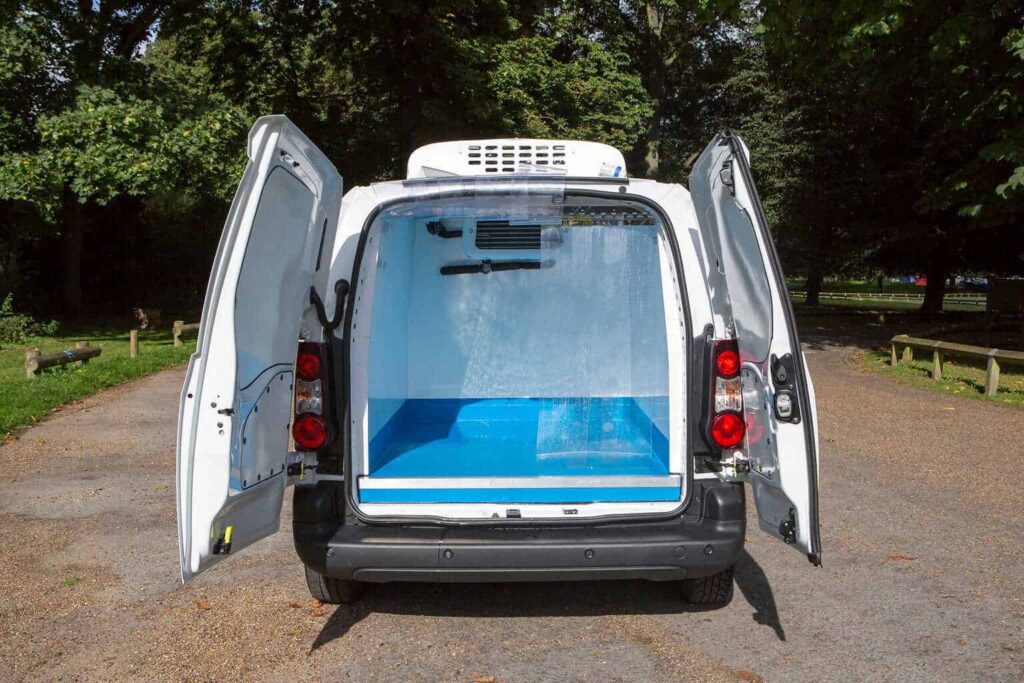For many businesses across the UK, the refrigerated van is more than just a mode of transport. It is an essential part of the supply chain, safeguarding product integrity, ensuring compliance with safety standards, and helping companies maintain the trust of their customers.
Whether you are a sole trader delivering flowers to customers or artisan cheeses to local shops, a catering company supplying large-scale events, or a pharmaceutical distributor delivering sensitive medicines across the country, understanding the specifications of refrigerated vans is vital.
Knowing the available sizes, payloads, and temperature ranges can help you make the right decision for your business, whether you are considering short-term hire or long-term leasing.
This guide is designed to provide a complete overview of refrigerated van specifications, giving you clarity on the options available, the factors you need to consider, and how to align these choices with the unique needs of your business.
Why Van Specifications Matter
Refrigerated vans are not simply standard vehicles with a cooling unit bolted on. They are carefully engineered systems designed to provide consistent and reliable temperature control across a wide range of conditions.
The wrong vehicle choice can compromise product safety, reduce efficiency, and even lead to compliance issues with regulators. A bakery that only needs to keep cream cakes cool on short trips will have very different requirements from a wholesaler delivering meat products across long distances.
In the pharmaceutical sector, the specifications required are often even more stringent, with temperature monitoring and stability forming part of regulatory compliance.
Understanding payload capacity, internal dimensions, insulation quality, and available temperature ranges can therefore make the difference between a van that supports business growth and one that holds you back.
Sizes of Refrigerated Vans
Refrigerated vans in the UK typically come in three main size categories: small, medium, and large. Each has its own advantages depending on the scale of your operation and the type of products you are transporting.
Small refrigerated vans are perfect for businesses operating in urban environments where tight streets, parking restrictions, and high levels of congestion are common. They are typically converted from compact vans and provide an internal load space suitable for modest deliveries. These vehicles are popular with sole traders, local butchers, florists, and independent food retailers who need reliable but agile transport solutions.
Medium refrigerated vans strike a balance between capacity and manoeuvrability. They are often chosen by catering firms, restaurants, and wholesalers who need more space than a small van provides but still want to avoid the bulk of a larger vehicle. Their internal load space is large enough to accommodate palletised goods, yet they remain flexible enough to navigate both towns and motorways with ease.
Large refrigerated vans are designed for maximum capacity and are often used by logistics companies, large-scale distributors, or businesses that need to transport high volumes of perishable goods over long distances.
Their spacious load areas can be customised with shelving or partitions, enabling businesses to carry multiple product types with different storage requirements. While they require more skill to drive and may face restrictions in congested areas, they are essential for companies with large distribution networks.
Choosing the right size is not only about fitting goods into the available space. It also affects fuel efficiency, accessibility, and even the long-term cost-effectiveness of your operations. A van that is too small will force you into multiple trips, wasting time and money, while one that is unnecessarily large may cost more to operate and lease than your business truly requires.
Payload Capacities
Payload is one of the most important specifications to consider when hiring or leasing a refrigerated van. Payload refers to the total weight that the vehicle can legally carry, including goods, equipment, and passengers. It is not enough to focus on internal dimensions alone, as a van with plenty of space may still be unable to carry heavy loads without exceeding its legal weight limits.
Small, refrigerated vans typically offer a payload of around 600 to 800 kilograms, depending on the specific conversion. Medium vans usually allow for a payload in the range of 900 to 1,200 kilograms, while larger vans can often carry up to 1,200 to 1,600 kilograms. These figures vary depending on the manufacturer and conversion details, so it is important to confirm precise specifications before making a decision.
For businesses transporting heavy items such as bottled drinks, frozen meats, or dairy products, payload can quickly become a limiting factor.
Overloading a van not only risks fines and penalties but can also put additional strain on the vehicle, leading to higher maintenance costs and reduced reliability.
Conversely, a business transporting lightweight but bulky goods may be more concerned with load volume than payload weight. Matching payload capacity with your specific cargo type is therefore critical.
Check out our post: Kerb Weight vs Gross Vehicle Weight (GVW): Why Are They Important for Refrigerated Vans?
Common standard van sizes in the UK:
- Small Vans
- Examples: Ford Transit Connect, Citroën Berlingo, Vauxhall Combo
- Load volume: around 2.3–3.3 cubic metres
- Payload: typically 600–800 kg
- Ideal for: light deliveries, urban use, tradespeople with small tools
- Medium Vans
- Examples: Ford Transit Custom, Volkswagen Transporter, Vauxhall Vivaro
- Load volume: around 5.8–6.6 cubic metres
- Payload: typically 900–1,200 kg
- Ideal for: catering businesses, equipment transport, moderate delivery runs
- Large Vans
- Examples: Mercedes Sprinter, Ford Transit, Renault Master
- Load volume: around 11–15.5 cubic metres
- Payload: typically 1,200–1,600 kg
- Ideal for: logistics firms, wholesale suppliers, long-distance deliveries
- Extra-Large / Luton Vans
- Examples: Ford Transit Luton, Mercedes Sprinter Luton
- Load volume: around 17–20 cubic metres
- Payload: typically 1,000–1,200 kg (due to heavier body)
- Ideal for: removals, bulky goods, high-volume distribution
Temperature Ranges
One of the defining features of refrigerated vans is their ability to maintain specific temperature ranges. The correct temperature setting ensures goods remain safe, fresh, and compliant with industry standards. Refrigerated vans can generally be divided into three main categories based on temperature control:
Chilled vans maintain internal temperatures between 0°C and 8°C. These are ideal for fresh produce, dairy, baked goods, and beverages that must be kept cool but not frozen. They are widely used by supermarkets, convenience stores, and caterers delivering to events.
Frozen vans are capable of maintaining temperatures as low as -18°C. These are essential for transporting frozen meats, ice cream, and other goods that must remain solid throughout the journey. Frozen vans often feature thicker insulation and more powerful refrigeration units to achieve these lower temperatures.
Dual-compartment vans provide the flexibility of carrying both chilled and frozen products simultaneously. By using partitions and independent temperature controls, businesses can serve multiple delivery requirements within a single journey. This makes them particularly valuable for catering firms, foodservice suppliers, and distributors with diverse product ranges.
Beyond these broad categories, temperature stability and monitoring also matter. Many businesses now require vehicles with built-in data logging systems to prove compliance with safety standards, particularly in the pharmaceutical and healthcare sectors.
Insulation and Build Quality
The insulation used in a refrigerated van is just as important as the cooling unit itself. Poor insulation can lead to uneven temperatures, increased energy consumption, and ultimately product spoilage.
High-quality conversions in the UK typically use materials such as Styrofoam or polyurethane for insulation, which provide excellent thermal resistance without adding excessive weight.
The build quality of the van should also be considered, as frequent loading and unloading, exposure to the elements, and long operating hours can all take their toll.
Durable finishes, hygienic interiors, and easy-to-clean surfaces are essential for food-related businesses, while pharmaceutical firms may require additional features such as antimicrobial linings or advanced temperature monitoring.
Matching Specifications to Business Needs
With so many specifications to consider, the real challenge lies in aligning your choice of van with your actual business requirements.
For example, a street food vendor may value agility, low running costs, and chilled capacity above all else, while a seafood distributor may need a larger vehicle with frozen capacity and dual compartments. Logistics firms handling multiple clients may need a fleet of vans across different sizes and configurations, allowing them to adapt to varying needs and delivery volumes.
Thinking about the entire supply chain is also crucial. The type of loading facilities at your depot, the distances you regularly travel, and the type of customers you serve should all factor into your decision. A van that works well for short local routes may not be suitable for national deliveries, and one designed for heavy goods may be inefficient for lighter loads.
Regulations and Compliance
Refrigerated vans in the UK are subject to various regulations and standards designed to protect consumers and maintain safety. Food businesses must comply with the Food Standards Agency’s requirements, ensuring that perishable goods are transported at safe temperatures. Pharmaceutical companies must adhere to Good Distribution Practice (GDP) guidelines, which place strict demands on temperature monitoring, validation, and documentation.
Failure to meet these standards can have serious consequences, from legal penalties to reputational damage. Choosing a van with the correct specifications and working with a trusted hire partner ensures compliance is maintained without unnecessary stress or risk.
The Role of Reliability and Support
While specifications such as size, payload, and temperature range are critical, the reliability of the van and the quality of the support behind it are equally important. Businesses cannot afford downtime, missed deliveries, or spoiled goods.
This makes partnering with a company that offers not only high-quality vehicles but also nationwide support services an essential consideration. A responsive maintenance and replacement service can make the difference between meeting delivery schedules and letting customers down.
Why FridgeXpress is the Best Partner for Refrigerated Van Hire in the UK
Selecting the right refrigerated van is only half the story. The partner you choose to provide that vehicle is equally important. FridgeXpress has established itself as the trusted name in refrigerated van hire and leasing across the UK, offering a wide range of vehicles to suit every type of business.
From compact chilled vans for urban deliveries to large dual-compartment frozen vehicles for national distribution, the breadth of choice ensures you will always find the right solution.
Expertise is at the heart of FridgeXpress. The team understands the challenges faced by businesses that rely on refrigerated transport and can provide tailored advice to ensure you choose the best vehicle for your specific requirements. Their knowledge of payloads, temperature ranges, and compliance issues means you can be confident in making the right choice every time.
What truly sets FridgeXpress apart is the level of support and coverage it provides. With a presence across the UK, the company ensures that no matter where you operate, you will always have access to reliable vehicles and responsive assistance.
Whether you need short-term hire to cover a busy period or a long-term lease that supports your growth, FridgeXpress combines flexibility with dependability.
In a world where efficiency, safety, and compliance are paramount, working with the right partner makes all the difference. With its extensive range of vehicles, deep expertise, and full UK coverage, FridgeXpress is the perfect choice for businesses that depend on refrigerated transport to succeed.
Refrigerated Van Specifications FAQs
- What sizes of refrigerated vans are available in the UK?
Refrigerated vans generally come in small, medium, and large sizes, with load volumes ranging from around 2.3 cubic metres in compact vans up to 15 cubic metres or more in large vehicles. - What does payload mean in a refrigerated van?
Payload refers to the total weight the van can legally carry, including goods, passengers, and equipment. It is essential to balance payload with the size and type of products being transported. - What temperature ranges can refrigerated vans achieve?
Refrigerated vans are typically set up for chilled (0°C to 8°C), frozen (down to -18°C), or dual-compartment transport, allowing both chilled and frozen goods to be carried at once. - How is insulation important in a refrigerated van?
High-quality insulation ensures stable temperatures, prevents energy loss, and protects perishable goods. Poor insulation can lead to spoilage and higher running costs.
5. Can I hire or lease a refrigerated van to match my specific needs?
Yes. Companies such as FridgeXpress offer a wide choice of refrigerated vans in different sizes, payloads, and temperature configurations, available for both short-term hire and long-term lease.




